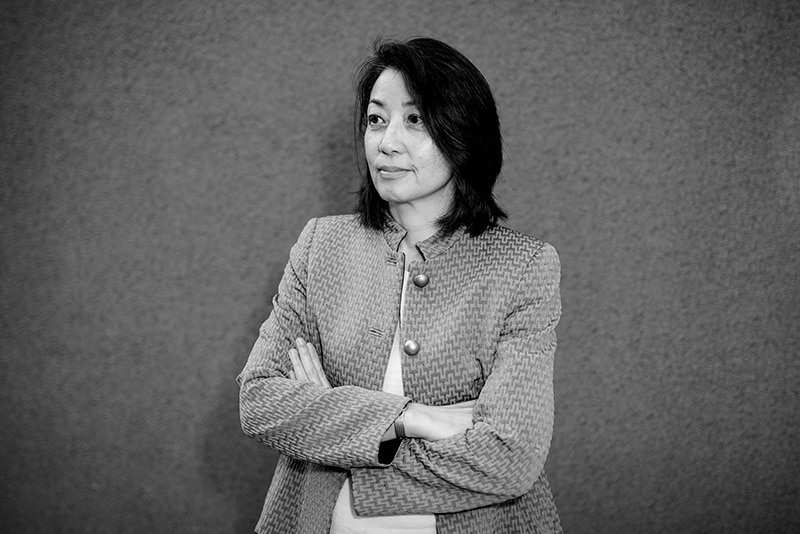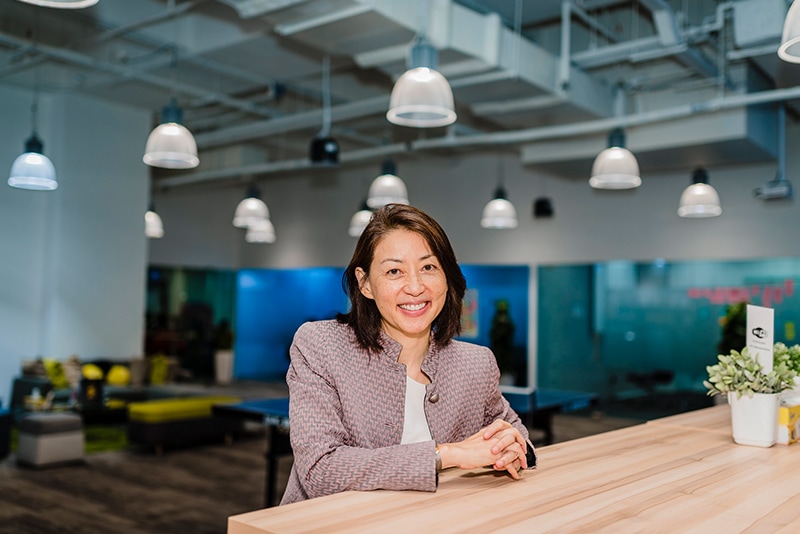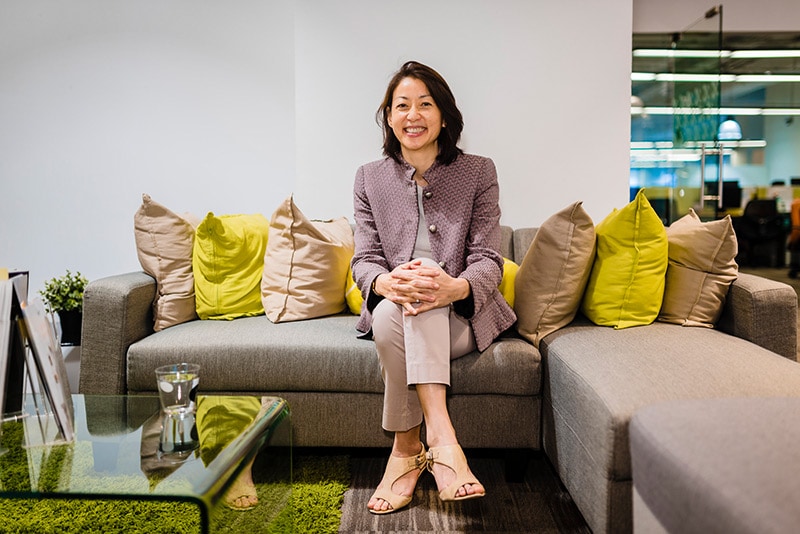At the helm of every new startup is typically a young, idealistic entrepreneur in their 20s or 30s, looking to shake things up. Rare is the sight of an industry veteran, nearing the retirement age with a sizeable accumulation of clout, in this realm of corporate disruption. Yet, that’s where Rosaline Chow Koo has decided to venture into. After a storied 30-year career that brought her to the top of a major multinational firm, Mercer, the CEO of CXA Group found herself back at ground zero at the age of 51. Not to be perceived as a mid-life crisis, but rather a well-intentioned move to address a gap in the market, CXA is breaking new ground in healthcare and corporate insurance, providing personalised wellness programmes to companies while reducing costs. Although she’s been a misfit her entire life, it’s also her secret weapon, the reason why she’s always one step ahead of change. This is the story of how Rosaline embraced the power of being different.
The Underdog Story of Rosaline Chow Koo
“I’ve always felt like an outsider,” confesses Rosaline Chow Koo. A statement like that is hard to believe, considering that the Chinese-American serves as the boss at CXA Group, the office of which we’re currently sitting in. An unequivocal luminary in her field, the 57-year-old entrepreneur is perpetually on the receiving end of mentorship requests, sometimes from established names in the local business arena. Love, Bonito’s chief commercial officer Dione Song, for instance, counts her as a treasured mentor.
As for her six-year-old insurtech startup, it’s already come into its own, raising a laudable $25 million in its latest funding round. Backed by investors such as Facebook’s Eduardo Saverin, it’s poised to become a unicorn. Needless to say, Rosaline by all means belongs to, nay, owns the sphere she’s in. Yet, it wasn’t always like this.
Her origin story is the stuff of Oscar dramas and sob stories. After escaping China, her father swam from Mexico to California, and survived as an illegal immigrant in America. Her mother had to flee the Communist Revolution as well, and abandon her two kids and then-husband who was eventually murdered. Her grandmother, on the other hand, ended up in a labour camp. This all led to Rosaline, growing up in squalor in the ghettos of Los Angeles.
“I was a young delinquent. I used to steal from stores,” divulges the founder, who has in her childhood been caught in the middle of riots, had her hair pulled in every which way, and lived in a slum where drive-by shootings were commonplace. Living in a predominantly black district as a petite minority also meant that getting beaten up was inevitable. To avoid trouble, she figured it was best not to stand out, and thus spent her subsequent years shying away from the spotlight.
Of course, life had other plans for her. Defeating all odds, she made it to UCLA, where she studied cybernetics and began her career in leadership. After graduating, she scored a stint at Procter & Gamble, managing 33 employees at a toothpaste factory. Imagine a 21-year-old Asian woman leading a factory full of white men. It would’ve been a struggle to command respect, but the self-made woman trudged on and relied on her indisputable skills, speeding up the production time from three weeks to a day.
Even after building a reputable career, the challenges didn’t stop. In 1996, Rosaline left the States, venturing out of her comfort zone to join her husband in Singapore. Besides feeling like an alien in a new city, she decided to take a break from work. Three and a half years went by as she devoted her time to her children. By the time she felt ready to get back to work, everything had changed. It was back to square one for her.
“It’s like motherhood does something to your brain. It sucks things out. My brain melted, talking to other mothers and my kids all day. I wasn’t thinking about work at all. I felt like I had regressed,” she recalls. Her confidence took a major dip as she struggled to regain her footing. What saved her was her ingrained leadership skills, which led her to found not one, but two startups in 1999, even though many of the newest software and technologies were foreign to her.
In many ways, being an outsider is her greatest strength. It’s the reason for her success. Rosaline doesn’t belong in the group of people that always follows the same formula. Neither does she belong in the group that reaches seniority in an organisation in their 40s and 50s. She’s the outlier that, in eight years (from 1987 to 1996), went from being a summer intern to the vice president of the Bankers Trust Company at 33. Still, it took some time for her to see that as a positive.
“I wasn’t a natural leader. I was a natural loser,” she tells me with utter conviction. Despite maximising efficiency to an unbelievable scale at her first job at Procter & Gamble, she considers herself “the worst manager ever to work in that Iowa plant”. Even after a string of impossible successes, Rosaline remained under the shadow of the Imposter Syndrome. It wasn’t until her 40s that she finally came around with a new, unshakeable sense of certainty and confidence in herself.
Embracing her inclination for not doing things the normal way, she took another leap amidst crazy stares, gathered her family’s life savings, and launched her third startup, CXA, at 51. “People told me I was 51, but I didn’t feel like I was 51,” she says, matter-of-factly. “I didn’t care what anyone thought.”
“It’s really a different world moving from being the APAC leader of a New York multinational to suddenly being nobody working out of your living room. I don’t think anyone took me seriously. Many people who knew me just said I started a website for my new company.” Except instead of a meagre website, it’s a pioneering AI-powered SaaS platform and corporate health insurance disruptor that offers personalised health benefits to each employee, focusing more on prevention than treatment.
What’s more, it all comes at no extra cost to the corporate client. Meanwhile, the rewards the company reaps—that is ultimately, a healthier, happier, more engaged and productive workforce—are manifold. Given the corporate-facing nature of CXA, Rosaline is also able to make the unorthodox, yet astute move of turning current investors into future clients.
Reflecting its founder’s inner misfit, CXA is a hybrid company that doesn’t seem to belong to any single category—among its many labels are health consultant, wellness marketplace, fintech and insurtech startup. Yet, those who don’t fit in create new spaces in which they rule, and that’s what Rosaline has accomplished. Its singularity is a secret weapon that allows the brand to establish a niche of its own.
Along with shattering the traditional model of corporate insurance, Rosaline is taking a non-standard approach to leadership as well, jettisoning top-down hierarchy and micro-management. She explains, “Decision-making is very fast as it’s important that we get to the future first, so we remove as much red tape and bureaucracy as possible.”
“My employees have no issues telling me straight to my face, ‘You look like shit today!’” quips the CEO, who takes an active stance in encouraging honest feedback even from the intern. While most businesses tend to prioritise profit over people (at times exploiting talents and squeezing them dry), CXA does it the other way around. Employees are the heart of this startup, and it shows in its culture.
The faint sound of bouncing ping pong balls occupies the background as Rosaline and I chat in the conference room. Take a further gander around and you’ll spy a foosball table, a treadmill, a blue yoga ball, and a black massage chair at the entrance of the work area—equipment that, she tells me, the employees asked for.
The staff also doubles as guinea pigs for the wellness programmes the company offers to clients. Once, it ran an eight-week challenge (among its 200 employees from Singapore, Shanghai, Beijing and Hong Kong) that included a health screening, health literacy seminars and nutrition and fitness contests. Between the food logs, mindfulness practices and physical activities, its employees shedded a total of 60kg and felt much happier in general. On top of that, various workers and departments host weekly, monthly and quarterly fitness classes and happy hour get-togethers.
“For Easter and Halloween, families bring their kids to my house for Easter egg hunting and to allow the kids to dress up and get scared by our haunted graveyard,” Rosaline adds. “Even though we are a startup, we are big believers in flexible work arrangements. We have quite a few telecommuting and part-time arrangements. In fact, one of our team members works from San Diego to take care of her daughter. We offer longer time off for new mothers and fathers, and every year, we have a family day, where you can bring your kids to work.”
Perhaps most telling of her genuine care for people is how much she regrets not removing toxic leaders sooner from her company. Though they were the ones who brought in all the revenue, they were also big bullies, who ended up driving countless subordinates out of CXA.
“I grew up poor and bullied, so I cannot stand people who pick on the helpless. In New York while I was in business school and in banking, I was known for chasing down purse snatchers, and fighting back against arrogant executives who take it out on their teams,” she says. “Teamwork is ultra-important since we’re all interdependent on each other, so I work hard to stamp out toxic people who do not treat others well.”
Today, CXA boasts more than 400,000 users in 20 countries, and continues to scale up and promote better living. Nevertheless, Rosaline will still be the first to admit she doesn’t have all the answers. “We’re building something that’s never been built before,” she emphasises. If there’s one thing to be sure of, however, it’s that the 57-year-old is proof that age is but a number, dreams are not just for the young, and that it pays to be different.




